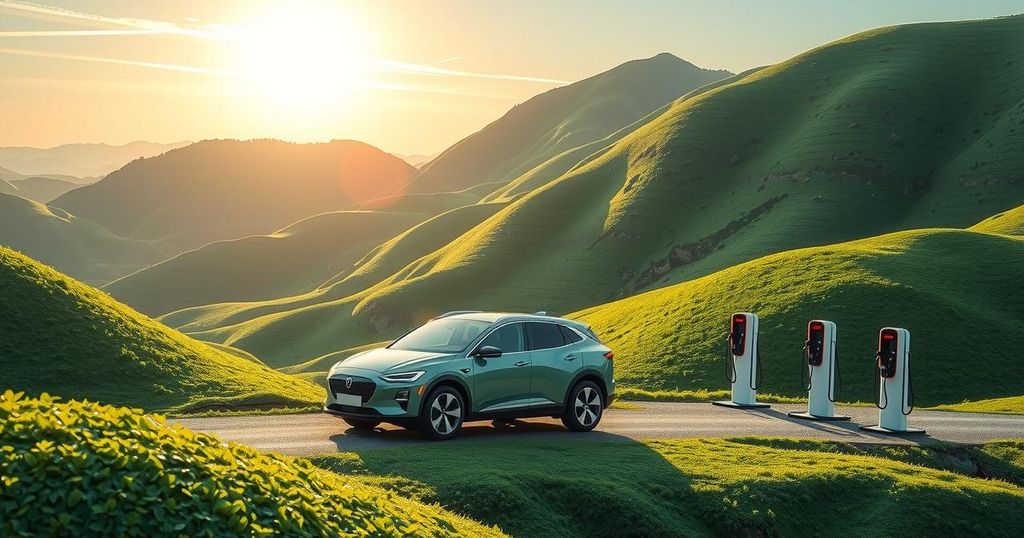Emerging Chinese EV Influence Transforming Malaysia’s Automotive Landscape

Malaysian automakers Proton and Perodua are under increasing pressure from Chinese EV brands expanding rapidly in the market. Despite holding a significant market share, local firms must pivot to affordable electric vehicles to maintain their positions. Chinese manufacturers, led by BYD, have captured nearly 40% of the market, challenging local strategies and infrastructure efforts. Opportunities for collaboration and technological advancements may emerge as competition intensifies.
The Malaysian automotive landscape is undergoing significant change as Chinese electric vehicle (EV) brands make substantial strides in the market. Proton Holdings Bhd and Perusahaan Otomobil Kedua Sdn Bhd (Perodua), despite being dominant players, face mounting pressure to pivot towards electric mobility. This shift is driven by the rapid expansion of Chinese manufacturers competing for market share, compelling local companies to rethink their strategies amidst a transforming industry.
As noted by Prof Emeritus Dr Barjoyai Bardai from Malaysia University of Science and Technology, Proton and Perodua represent about two-thirds of industry volume. While Proton’s alliance with Zhejiang Geely provides a competitive advantage, the transition necessitates the introduction of cost-effective EV models. Import taxes on EVs and insufficient charging infrastructure continue to hinder widespread adoption, with Chinese models potentially revolutionizing affordability.
Leading Chinese brands, notably BYD, now command almost 40% of the Malaysian EV market. Industry data indicates BYD leads at 39.33%, followed by Tesla at 23.58% and BMW at 9.06%. Additional notable competitors include Great Wall Motor, Chery, and Smart, reflecting the increasing visibility of Chinese firms in the Malaysian automotive space.
Dr Mohd Afzanizam Abdul Rashid, chief economist at Bank Muamalat Malaysia Bhd, emphasized that the dominance of Chinese EV brands heightens competition and encourages innovation among domestic players. Aside from pricing, factors such as charging infrastructure and maintenance services significantly influence the long-term viability of these vehicles in the market.
The Malaysia Automotive Robotics & IoT Institute (MARii) views the influx of Chinese EV manufacturers as an opportunity for growth rather than a threat. Their entry is accelerating EV adoption, stimulating innovation, and enhancing benchmarks for technology and customer experience. This situation challenges local manufacturers to upskill and invest in R&D to foster regional leadership in next-generation vehicle production.
Traditional auto part suppliers are now prompted to upgrade their capabilities due to the reduced reliance on moving components in EVs compared to internal combustion engines. The surge of global automakers like Stellantis and Great Wall Motor establishing operations locally is also reshaping the competitive landscape, prompting local distributors to adapt or consolidate.
Maybank Investment Bank Bhd suggests that local firms must enter technical partnerships and invest in skills development to remain relevant in this evolving market. As competition escalates, Proton and Perodua are urged to tackle significant technological gaps to maintain their positions in the burgeoning EV segment.
MARii proposed that local automakers collaborate on developing battery technologies and electric motors, which could minimize production expenses, boost efficiency, and foster innovation. This collective effort could lead to the production of more competitive EV offerings, thus furthering the adoption of electric vehicles in Malaysia’s accelerating market.
Overall, the rise of Chinese EV manufacturers is transforming the Malaysian automotive industry, presenting challenges for local players but also unlocking avenues for innovation and collaboration throughout the supply chain.
The Malaysian automotive sector is increasingly influenced by the entrance of Chinese electric vehicle (EV) manufacturers. Traditional leaders in the market, Proton and Perodua, now confront pressure to transition alongside evolving market dynamics. This transition involves technological adeptness, competitive pricing, and strategic partnerships aimed at fostering growth and innovation as Malaysia seeks to enhance its EV landscape. The need for infrastructure improvements, such as charging stations and tackling high import duties, complicates the local adoption of EVs, yet affordability remains a crucial factor that can tip market dynamics favorably towards EV adoption.
In conclusion, the influx of Chinese EV brands in Malaysia is reshaping the automotive landscape, intensifying competition, and compelling local manufacturers to innovate. While traditional automakers face challenges in transitioning to EVs, opportunities exist for collaboration and technological advancements, fostering an environment ripe for growth. Overall, the influx of international players and the evolution of consumer demands signify a pivotal point for the automotive industry in Malaysia.
Original Source: thesun.my






